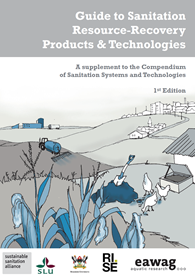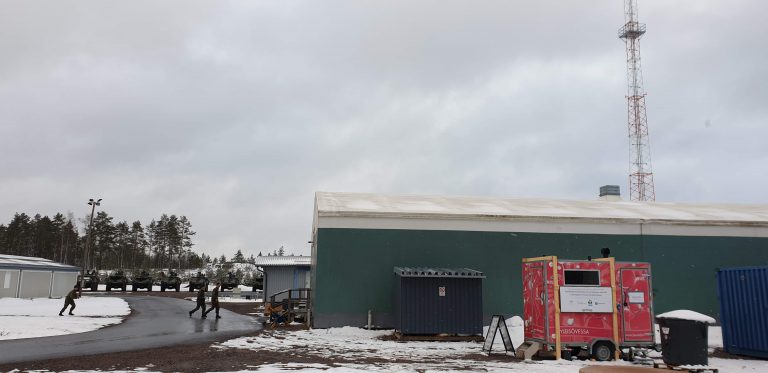Recently, Cecilia Lalander and Viktoria Wiklicky from our research group made a short 12 min video of the our Black Soldier Fly (BSF) rearing colony. Click on the link below to take a virtual tour of our facilities and to learn how we rear our flies, how the flies/larvae move through the various stages of their life cycle, and how to treat organic wastes using BSF larvae.
Author: Prithvi Simha
Launching the Guide to Sanitation Resource-Recovery Products & Technologies

We are pleased to announce the we will soon be publishing a Guide to Sanitation Resource-Recovery Products & Technologies! To launch this publication we are hosting a webinar on the SuSanA forum.
When? 22nd of October, 2020 between 14:00-15:00 CEST. Details and registration can be found on this link: https://www.susana.org/en/news-and-events/sanitation-events/upcoming-events?details=170
This Webinar is organized by the Swedish University of Agricultural Sciences (SLU), Makerere University and the Research Institutes of Sweden (RISE) in collaboration with SuSanA working group 5 as part of the SPANS research project. It will present a new publication related to resource recovery from sanitation systems – the Guide to Sanitation Resource-Recovery Products & Technologies. The publication is designed as a supplement to the Eawag Compendium of Sanitation Systems and Technologies. It provides an overview of the possibilities for resource recovery from sanitation and provide guidance on treatment processes to achieve safe products for reuse. The webinar will introduce the guide, including an overview of the technologies and products that are covered in the document, and discuss how the information sheets can be used a reference book for sanitation planning and decision-making.
Publication on field testing alkaline urine dehydration at pilot-scale in Finland
In early 2019, we designed and installed a pilot shell system to dry fresh urine collected from about 100 toilet users each day (or a maximum of 30 liters of urine day-1). The system was implemented at a Finnish army training ground (Camp Mauri) belonging to Pori Brigade, which is a garrison in Säkylä, Finland and was used for a period of three months between March and May 2019. In a new publication in the journal Frontiers in Environmental Science, we describe results of the evaluation of the technology. The publication can be openly accessed here:
Simha P, Karlsson C, Viskari E-L, Malila R and Vinnerås B (2020). Field Testing a Pilot-Scale System for Alkaline Dehydration of Source-Separated Human Urine: A Case Study in Finland. Front. Environ. Sci. 8:570637. doi: 10.3389/fenvs.2020.570637

New Post Doc in the group will work on wastewater sustainability assessment

My name is Priscila Lima and I have just started a postdoc within the Environmental Engineering group. I am originally from Brazil and I have lived in the US and in Denmark for some time. I am an Environmental Engineer that has been working with solid waste management systems ever since my bachelor’s thesis. Most recently, my PhD thesis was on Environmental Assessment of solid waste systems for Brazil and a case study in my Municipality in the west central region of the country, and I used Life Cycle Assessment for this. Before coming to Sweden I was performing research in my hometown, with a main focus on Life Cycle Assessment of different types of waste. Now, I have joined Jennifer at Kretsloppsteknik in a project to assess the sustainability aspects of waste systems, with main focus on nutrient recovery from these systems.
EVAS – a practical tool to assess the sustainability of small wastewater treatment systems in low and lower-middle-income countries

Claudia Cossio, a former PhD student affiliated with the group, has published an article regarding the development and application of an Excel-based tool to holistically evaluate the sustainability of existing wastewater treatment plants in low and middle income countries. Many small wastewater treatment systems (WWTSs) in low and lower-middle income countries face challenges to achieve optimal performance and acceptable levels of sustainability. In order to provide guidance for operation of these systems, Claudia and her colleagues developed a practical tool to diagnose the actual status of WWTSs and identify weak areas for further improvement.
The article is available Open Access – https://doi.org/10.1016/j.scitotenv.2020.140938
The Excel tool is available on the Chalmers website – https://research.chalmers.se/en/publication/516714
New book chapter discusses alkaline urine dehydration at scale

In a bio-based circular economy, domestic wastewater has a significant role to play. By separating wastewater into different fractions at the source, it is possible to create new pathways for recycling resources. In a book chapter published in Current Developments in Biotechnology and Bioengineering, Simha et al. discuss about the most nutrient-rich wastewater fraction, human urine. We present a new, simple, yet potentially revolutionary nutrient recycling technology — alkaline urine dehydration. We then describe how this technology can be combined with urine-diverting toilets and integrated with existing sanitation infrastructure to create a service chain that safely collects, contains, transports, and applies urine as fertilizer. The potential benefits, risks, knowledge gaps, and challenges surrounding the implementation of a urine-diverting and dehydrating sanitation system are discussed. Finally, the prospect of creating smart toilets and digitizing the proposed sanitation system are explored. To read the full chapter, follow the link below:
Simha, P., Senecal, J., Gustavsson, D. J., & Vinnerås, B. (2020). Resource recovery from wastewater: a new approach with alkaline dehydration of urine at source. In Current Developments in Biotechnology and Bioengineering (pp. 205-221). Elsevier.
Alternatively, Click here to access the freely available pre-print version of the chapter on RG
Reduction of bacteria in relation to feeding regimes when treating aquaculture waste in fly larvae composting

The partnership between the Environmental Engineering Group at SLU and Dr. Ivã Guidini Lopes from the Aquaculture Center of Unesp (São Paulo, Brazil) resulted in a second publication, entitled “Reduction of bacteria in relation to feeding regimes when treating aquaculture waste in fly larvae composting”, recently published in Frontiers in Microbiology, as part of the research topic “Microbial dynamics during industrial rearing and processing of insects”.
Jenna Senecal talks to P4 Gotland for S360 winning the Skapa Prize
Link to interview in Swedish: https://sverigesradio.se/sida/avsnitt/1531483?start=7303 ; (Start listening from 02:01:39)
Sanitation360 wins the Skapapriset 2020 for Gotland County

Our group’s spinoff company, Sanitation360 AB, was recently declared the winner of the Skapapriset for Gotland, where the company is based. The jury on Gotland was of the opinion that the S360 team (Jenna, Björn and Prithvi) were very good representatives for Gotland. S360 now moves onto the final round, where we will compete with companies from all the Swedish counties.
The SKAPA Prize is Sweden’s largest innovation award, with the aim of providing support to inventors to develop their ideas. SKAPA is a foundation founded in memory of Alfred Nobel in 1985 and awarded its first prize in 1986. Behind the foundation stands the Stockholm Fair and the Swedish Inventors’ Association supported by Almi Företagspartner AB, VINNOVA, the Agne Johansson Foundation and the Patent and Registration Office. The prize is first awarded at the county level, where all county winners receive SEK 10,000, then nationally.
Vote for Sanitation360 to win the “Create the Future Design Contest”
The group’s startup company, Sanitation360 AB, is taking part in the Create the Future Design Contest, which was first launched in 2002 by the publishers of Tech Briefs magazine to help stimulate and reward engineering innovation. Our entry which is called “Save the world by going to the bathroom!” puts forward our research and development of the urine drying concept, where the idea is to convert human urine into a dry, safe, nutrient-rich solid. The most popular entries will be decided by the voting of registered users of the contest web site. So help us by going to this website, where you can register as a user and vote for Sanitation360!
Click here to Vote for Sanitation360

